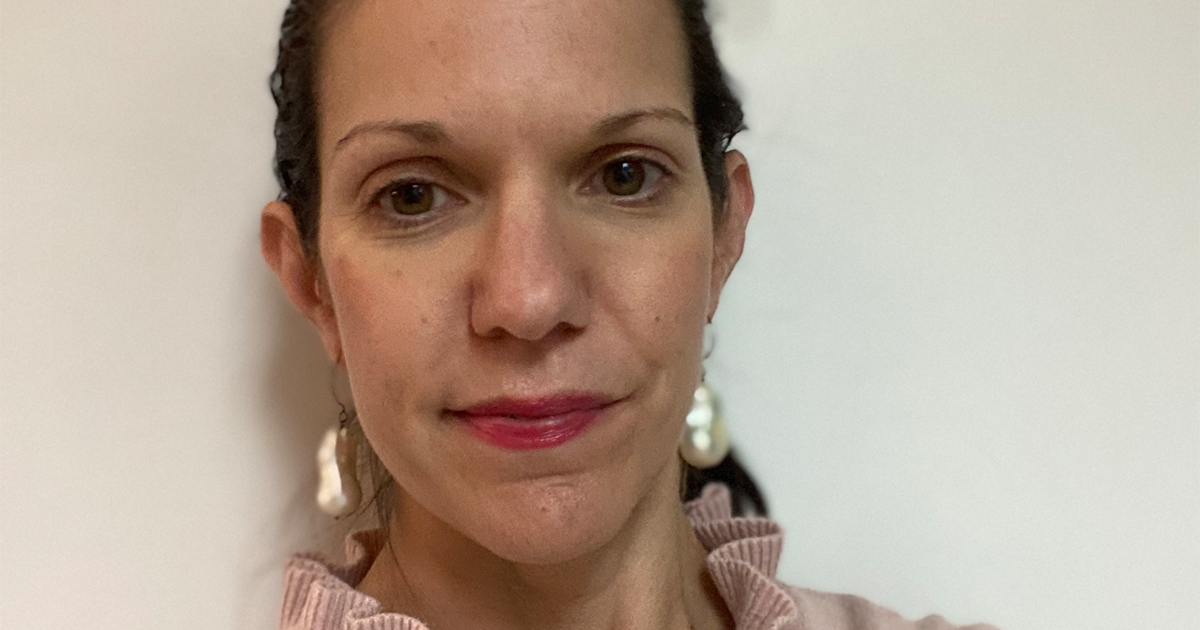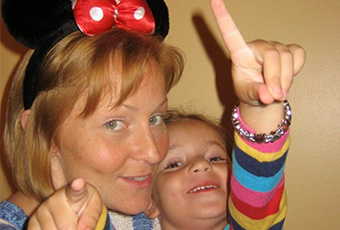Navigating a new land: How one patient became empowered through her chronic disease

Perhaps there is no good way to be diagnosed with a chronic disease, but one way I would not recommend would be over the phone, and especially not over the phone from a neurologist you have never met. Certainly worse things can happen, but this is how I received my diagnosis of multiple sclerosis (MS). But first let me explain why I was having an MRI in the first place.
Over a decade ago, I was visiting with a friend and her four-week-old. While my friend went upstairs to put something away, I picked up her baby to cuddle with her and began walking through the living room with her when I inadvertently fell on the wood floor with the baby tucked in my arms.
Thankfully the baby was unscathed, but this served as a wakeup call for me. That night, I called and left a message with my primary care doctor’s office asking to be seen as soon as possible. I was able to get in the following day and see Pam, my doctor. Pam could sense my tension and asked what brought me in. After explaining the most recent fall I had with the baby, as well as accounting for a few others that took place over the past months, I then went on to complain of numbness and tingling I was experiencing in my legs and feet. Pam conducted a few tests, then asked me to walk across the room, heel-to-toe, a test known as the tandem gait test, one that is commonly used in neurological exams to test imbalance. Clumsily, I made my way across the room, swaying as I struggled to maintain my balance.
After seeing this, Pam told me she’d be placing an order for me to have an MRI and suggested I have this test done today. The sooner I had the scan, the sooner I’d receive the results as they were typically available within a week after the test. I had my first MRI that day. Three weeks later, I still had no results. That is when I called the hospital.
There are so many things I now understand about MS that I didn’t before, like MRI results are instantaneous. The waiting is not because of how long it takes to see the results, it is waiting for your neurologist to read the test, then contact the patient. Since I did not yet have a neurologist, I was assigned to one at the hospital. I later found out he was about to retire, which could account for his abrasive bedside manner, but doesn’t remedy it.
The memorable conversation I had with that neurologist went something like this:
“Ms. Irish, hello. Thanks for waiting. Your results were…surprising…”
No one wants to hear the words ‘surprising’ and ‘your results’ in the same sentence from the neurologist reading your test.
“Your scans displayed a railroad track of lesions.”
Lesions? What the hell were lesions? I pictured a rash on an arm when traveling through a jungle. I had no idea lesions could be found on the brain. And railroad tracks? What did that even mean?
“From these results, it looks like you have primary progressive multiple sclerosis.”
Furiously I wrote down every word he said, pausing to ask him to spell ‘sclerosis’ and ‘lesions’ as these words were new to me. He then suggested I come to his office to discuss the results in person. I already knew I was more interested in finding another neurologist, but decided to go in for one visit. It was my first and last visit with that doctor.
I suppose advocating for myself wasn’t especially difficult, but I was in a new environment. I thought I was healthy, but I had no idea what the healthcare world was like. People want to be helpful and when they find out you have a chronic disease, they want to share something they consider useful with you. Take this as a compliment—these are people showing they care. Thank them for sharing, write down anything that may be useful, but always trust your gut on what you feel is worthwhile.
Since so much jargon in the medical world is unfamiliar to patients, remember it is your right to ask questions about anything you don’t understand. Often I bring a list of questions printed out with me to my appointments. Remember there is only one you and there are many neurologists. Don’t feel you need to stay with a doctor who makes you feel uncomfortable.
After my call with the ‘railroad track’ neurologist, I immediately began to search online about multiple sclerosis. I was not at all familiar with this disease and needed to find people who were.
It is funny the people who help you out in moments like this. For me, I found my first neurologist through a recommendation from a couple I babysat for and continued to keep in touch with. They were adamant that I check out the Mandell MS Center in Hartford, CT. It was founded by Andy Mandell in 2008, who became frustrated with the grueling process of having to go to various facilities for the necessary tests an MS patient needs to be diagnosed. A successful businessman with ample financial resources and connections, Andy was able to receive support from several business and medical leaders and when the Mandell Center for Multiple Sclerosis was established in Hartford, CT, Dr. Peter Wade, a neurologist who also had MS, was selected to be the Center’s first Medical Director. He is who I chose as my first neurologist.
I’ll alway remember my first appointment with Dr. Wade. After reviewing my chart, he closed the manilla folder, tossed it on the exam table next to where I was sitting and said, “MS really sucks, doesn’t it.”
My eyes welled with tears and I nodded in agreement. I wasn’t sure if he was kidding or what he was going to tell me, but then he went on to tell his own story of how he found out he had MS. He was an undergraduate studying physics when one morning he couldn’t get out of bed. “My legs stopped working,” he told me.
It was then that decided he wanted to focus on medicine and ultimately, neurology. To have a neurologist share his MS diagnosis story with me made me love and admire him. Those initial conversations I had with Dr. Wade when I was newly diagnosed made a tremendous difference. As a new patient, I was scared of MS and of who I might or might not become as a result of this disease, but by hearing Dr. Wade’s story and seeing how successful he was, I felt reassured. Dr. Wade went on to tell me the other neurologist did not know what he was talking about and that I did not have primary progressive MS, but the less severe, more erratic relapsing remitting MS. With that news, I knew I’d be in good care with Dr. Wade.
I was a patient of Dr. Wade’s for five years before deciding I wanted to see a different neurologist. (Just to write that sentence today makes me laugh out loud. I took for granted how fortunate I was that there were MS facilities to choose between. This is in contrast to where I now live, a large city in the mid-atlantic, where MS facilities are not covered by insurance and patients must pay out of pocket.) At Yale, I became a patient of Dr. Hafler, a wise, caring, world-renowned expert on MS and once again felt confident I was in good hands. I was Dr. Hafler’s patient for only two years, but still keep in touch with him, emailing him questions or concerns I may have and he graciously always replies.
When I moved to Virginia for work, I was not prepared for the vastly different medical landscape I was exposed to. MS facilities were no longer an option and I would now need to get acclimated to a new team of doctors. One major issue for me with MS is fatigue. Fatigue in MS patients can be difficult to explain to other people. I’ll never forget a conversation I had with my older sister when I told her how I always felt so exhausted, to which she said, “Sometimes I feel tired too. You should take a nap!”
I wanted to scream, but hung up on her instead. Fatigue in MS can’t be resolved by taking a nap; it can feel like you had a hard-core gym workout and are wiped out when you get out of bed to make coffee. I had been prescribed medication for fatigue early on, starting with Provigil and moving on to Adderall. While this medication has raised a lot of eyebrows, I had been responsibly using this medication, but now that I was living in Virginia, this was an entirely different ordeal. This unfortunately resulted in a few condescending conversations between myself and other health care professionals.
On one such occasion, I “fired” a neurologist after she made a comment about me “carrying on like Elvis by taking uppers.” I reminded her Elvis did not have MS and left her office. When a patient with a chronic disease moves, recreating a medical team can be overwhelming. Yale has been wonderful as they have always left the door open for me, allowing me to ask any questions I may have. Sadly, not every state has resources like Yale or the Mandell Center, so if as a patient you have access to this, take advantage of it. Having a chronic disease opens doors for you to have new relationships with various people in the healthcare field. Embrace these positive relationships and shed the ones you don’t need. It is through these connections that you’ll establish your own team of advocates.
Katie’s quick tips for how to live with a chronic illness:
Recognize as a patient you deserve respect.
Try to learn all you can about your disease. I prefer to use sites ending with .edu. Here are a few:
Advocate for yourself. Bring a notebook to each appointment with questions written out prior to the visit and ask questions of information you have heard that you have found confusing and seek clarification. This will make you a knowledgeable patient and the notebook can serve as a point of reference.
Connect with other neurologists/medical professionals through LinkedIn or other networking activities, such as attending an online discussion. Here is an example of a talk I plan to attend via Zoom.
Remember as a patient, you are a paying customer. While you are in need of a neurologist, the neurologist should prove to you he or she is worthwhile! This will come through in your doctor/patient interactions. I also encourage patients to look up their doctor to get a sense of their background before their first appointment.
Expect the unexpected. As I write this, I have just recovered from contracting COVID for a second time! I stay up to date on all COVID shots, but some things are out of your control.
Take care of yourself. While your neurologist is able to prescribe MS medications, there is a lot you can do for yourself. Exercise. Some MS centers offer yoga for patients. Do what you can do and be proud of yourself for doing it! Seek holistic care. This was another benefit from being a patient at an MS center: free acupuncture for patients! What a gift! Meditate. Meditation calms the mind and soul and is truly healing, inside and out.
Disclaimer
Member comments have been lightly edited for length and clarity. This content is for general informational purposes only and does not necessarily reflect the views and opinions of any organization or individual. The content should not be used as a substitute for professional medical advice, diagnosis, or treatment. Please consult your healthcare provider about any questions you may have regarding a medical condition.




